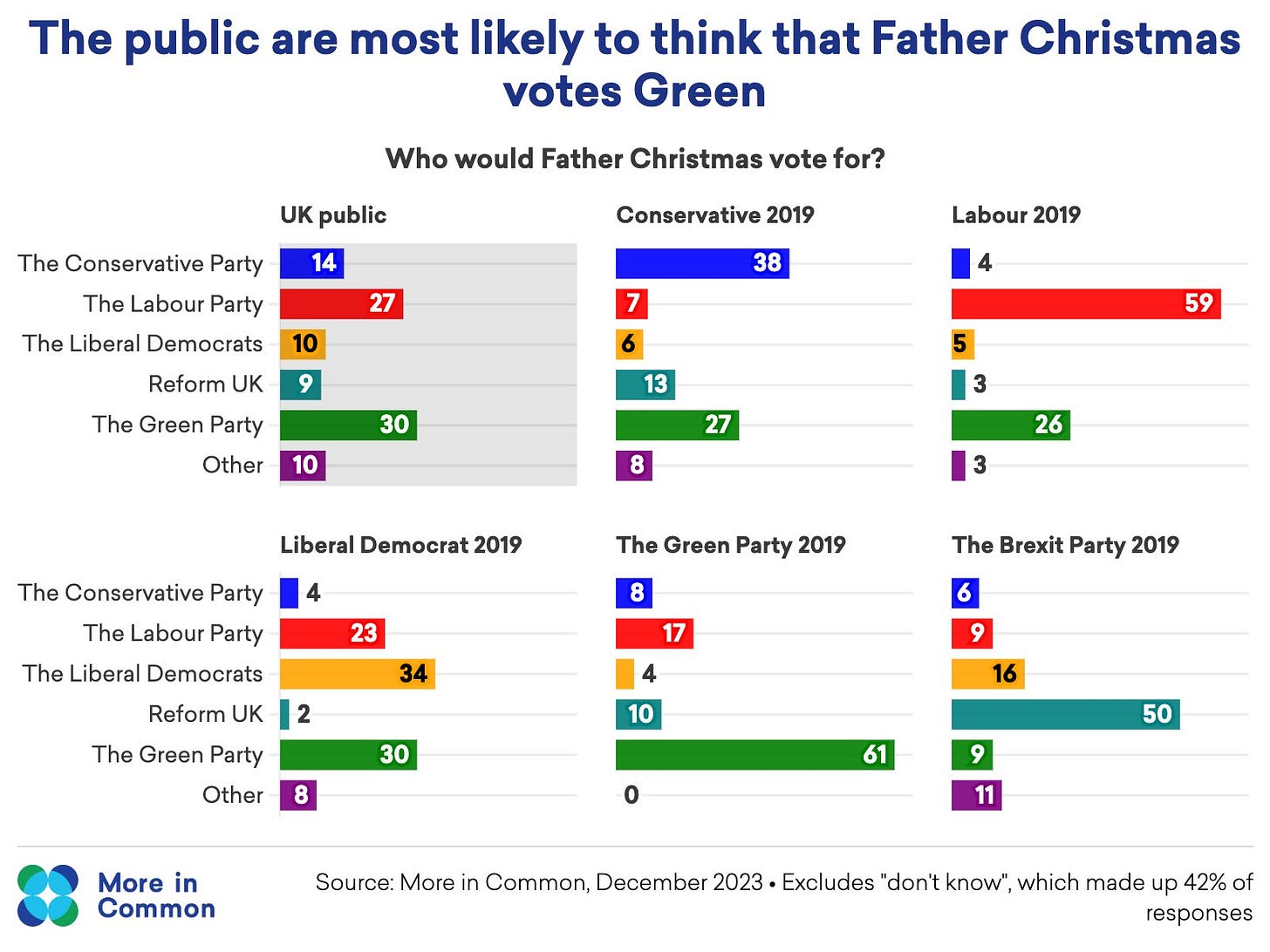Voodoo polling, Christmas polling and a correction to some polling

Welcome to the 87th edition of The Week in Polls, and don’t worry. You haven’t overslept. It isn’t 6pm on Christmas Eve and all your Christmas preparation plans are a mess. I’m just sending this a day earlier than usual.
This time we’ve got a final sigh of disappointment for the year for a media report of a poll, a correction to a graph and some fun Christmas polling.
Plus the usual look at the latest voting intention polls followed by, for paid-for subscribers, 10 insights from the last week’s polling and analysis. (If you’re a free subscriber, sign up for a free trial here to see what you’re missing.)
As ever, if you have any feedback or questions prompted by what follows, or spotted some other recent polling you’d like to see covered, just hit reply. I personally read every response.
Been forwarded this email by someone else? Sign up to get your own copy here.
Already a reader and know others who might enjoy this newsletter? Refer a friend and you can get up to 6 months of free subscription to the paid-for version.
Want to know more about political polling? Get my book Polling UnPacked: the history, uses and abuses of political opinion polling.
Before we get to Christmas…
Voodoo polling rides again
Oh dear. This was the New Statesman write-up:
Nature, biodiversity and tackling water pollution are key issues that could swing environmentally-conscious voters at the next general election.
Based, it says, on a poll:
The Wildlife Trusts … polled 1,138 of its members and supporters
The reality? The Wildlife Trusts ran an online survey, open to anyone (members, supporters, the curious, opponents and lost internet wanderers). The survey itself even said:
The more the merrier! Please share the link to the survey with your contacts on social media using the buttons below.
Then the voting information came from “an opt-in follow-up” to the open-access survey.
That’s not a proper poll. This sort of open self-selecting polling is often called voodoo polling because of the huge number of ways in which it can be inaccurate. Plus as Anthony Wells points out:
For crying out loud, it's not a survey of the general public, it's a survey of the Wildlife Trust's *own members*. Members of environmental/wildlife charity care about environment & wildlife shocker.
File alongside the damn fool Fair Fuel surveys showing that - miraculously - their supporters care about fuel prices.
And all that is without getting into how polls picking out a single topic and asking people if it will influence their vote often hugely over-estimate the topic’s impact.
Nor without getting into why the New Statesman decided to report these figures to the nearest one tenth of one percent.
To be fair, these sorts of surveys do sometimes have some value, as - ahem - I talk about in Polling UnPacked, where I fess us to my own use of them on occasion and the lessons for their value. But this isn’t one of those.
A correction
When writing about polling on immigration, I included a graph from Professor Rob Ford. He’s since corrected the graph, which included data from several different time series but one of those was for a significantly different question than the others. The corrected version of the graph still tells the same story as the original, and so the conclusions I drew from it are still valid. But I’ve updated the earlier edition online and you can read about the correction in Rob’s series of posts here.
Some Christmas polling
Let’s move on to some fun stuff.
First off, how does Father Christmas vote?
But we’re increasingly not calling him Father Christmas:
Penultimately, who is on the naughty and nice steps? Ipsos has the answer:
And finally, an update on polling about whether or not Die Hard is a Christmas movie. Previously I reported data from YouGov which found:
The public splits 38% yes and 39% no. Remains are more likely to say it is a Christmas movie: it’s at +5 among them but down to -9 among Leavers.
Now Deltapoll has a more decisive result: 37% yes, 44% no, with a +6 result among Remainers but a huge -18% among Leavers.
Make of that what you wish.
National voting intention polls
The year comes to an end as it has been consistently in the second half of the year - with another week without a poll putting the Conservatives on more than 30%, extending the run stretching back to late June 2023. The lowest of low benchmarks, the Duke of Wellington’s crushing defeat in 1832, continues to be better than the current Conservative Party’s standing.
Here are the latest figures from each currently active pollster:
For more details and updates through the week, see my daily updated table here and for all the historic figures, including Parliamentary by-election polls, see PollBase.
Last week’s edition
Net Zero and immigration polling news.
My privacy policy and related legal information is available here. Links to purchase books online are usually affiliate links which pay a commission for each sale. Please note that if you are subscribed to other email lists of mine, unsubscribing from this list will not automatically remove you from the other lists. If you wish to be removed from all lists, simply hit reply and let me know.
The public trust pollsters more than politicians, and other polling news
The following 10 findings from the most recent polls and analysis are for paying subscribers only, but you can sign up for a free trial to read them straight away.
Keep reading with a 7-day free trial
Subscribe to The Week in Polls to keep reading this post and get 7 days of free access to the full post archives.





